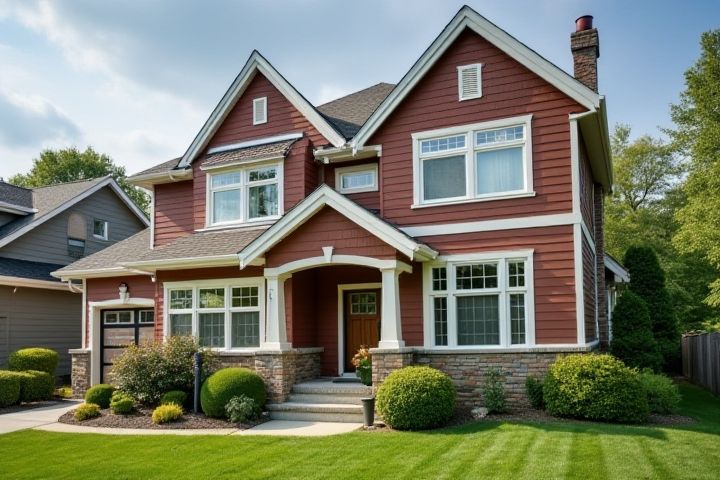
House upgrades can be tax-deductible depending on their nature and purpose. If you renovate your home for medical purposes, such as installing wheelchair ramps or modifying bathrooms, those costs may qualify for deductions on your tax return. Energy-efficient improvements, like solar panels or energy-efficient windows, can also lead to tax credits, reducing your overall tax liability. However, general renovations that increase property value do not typically qualify as tax-deductible expenses. To ensure you maximize potential deductions, consult a tax professional who can provide tailored advice based on your specific situation.
Are House Upgrades Tax Deductible
Capital Improvements
Capital improvements to your home, such as adding a new roof, renovating a kitchen, or installing energy-efficient windows, can enhance your property's value and may be eligible for tax deductions. These upgrades are considered investments that typically increase the basis of your home, potentially lowering capital gains taxes upon sale. However, routine maintenance or repairs, such as painting or fixing leaks, do not qualify as capital improvements and are not tax deductible. Consulting a tax professional is advisable to navigate the specific eligibility criteria and maximize your tax benefits related to home improvements.
Energy-Efficiency Tax Credits
Energy-Efficiency Tax Credits can provide substantial savings on your tax bill if you invest in qualifying house upgrades. Improvements such as installing energy-efficient windows, insulation, HVAC systems, and solar panels may qualify for these credits. To benefit, ensure you keep detailed records of your expenses and consult the IRS guidelines for specific eligibility requirements. Maximizing these credits can significantly enhance your home's environmental impact while providing financial relief on your taxes.
Medical Home Modifications
Medical home modifications, such as installing ramps, widening doorways, or adding grab bars, can significantly improve accessibility for individuals with disabilities or health conditions. These modifications may qualify as deductible medical expenses on your federal income tax return, under IRS guidelines, provided they primarily serve a medical purpose rather than increasing your home's value. You need to keep detailed records, including receipts and invoices, to substantiate your claims. Consulting a tax professional can help ensure you maximize any potential deductions for these necessary home enhancements.
Home Office Improvements
Home office improvements may qualify for tax deductions if they align with IRS guidelines. For instance, if you allocate 300 square feet of your home exclusively for business use, you can deduct a portion of related expenses. This includes upgrades like new lighting, furniture, or insulation, calculated based on the percentage of your home dedicated to the office. Keep thorough records of your expenses to support your deductions during tax preparation.
Rental Property Upgrades
Rental property upgrades can often be tax-deductible, as they directly enhance the property's value or modify its function. Costs associated with significant improvements, such as renovations to kitchens, bathrooms, or landscaping, may qualify for depreciation deductions over time, allowing you to reclaim a portion of these expenses annually on your tax return. Routine maintenance and repairs, which preserve the property's condition without significantly increasing its value, are usually fully deductible in the year they occur. It's essential to keep detailed records of all expenses and consult a tax professional to maximize your tax benefits related to rental property upgrades.
Repairs vs. Improvements
Repairs to your home, such as fixing a leaky roof or patching drywall, are generally tax-deductible if they are related to rental properties, as they maintain the property's value without increasing it. Improvements, like adding a new deck or remodeling a kitchen, increase the home's value and are not immediately deductible; instead, they can be factored into your home's basis for capital gains tax calculations when you sell. Keeping accurate records of both expenses helps you distinguish between repairs and improvements for tax purposes. Consult a tax professional for personalized advice tailored to your specific situation and to maximize potential deductions.
Historic Home Renovations
Historic home renovations may offer tax deductions under specific circumstances, especially if the property is registered on the National Register of Historic Places. You might be eligible for a federal tax credit of up to 20% of your eligible rehabilitation expenses if your renovations meet the requirements. Local and state governments can provide additional tax incentives for preservation efforts, further reducing your overall renovation costs. Always consult with a tax professional to ensure you maximize your deductions and comply with regulations specific to historic properties.
Mortgage Points
Mortgage points, also known as discount points, can impact your tax deductions when upgrading your home. If you pay points to reduce your mortgage interest rate, these costs may be deductible in the year they are paid, provided you meet specific criteria set by the IRS. It's essential to ensure that the mortgage points are associated with your primary residence to qualify for this deduction. Consult with a tax professional to maximize your savings and confirm eligibility based on your unique situation.
Property Taxes
House upgrades generally do not qualify as tax-deductible expenses for property taxes. However, you can benefit from deductions related to property taxes based on your home's assessed value. For the tax year 2023, homeowners can deduct up to $10,000 in state and local taxes, including property taxes, if filing as a single taxpayer or a couple. It's important to keep accurate records of your property taxes, as they can significantly impact your overall tax liability when filing your return.
State and Local Incentives
House upgrades may qualify for tax deductions under state and local incentive programs, particularly when they improve energy efficiency or promote sustainability. For example, many states offer tax credits for installing solar panels, energy-efficient windows, or HVAC systems, potentially reducing your tax liability by up to 30% of the total project cost. Each state has specific eligibility criteria, which can include a minimum investment threshold or a requirement to use approved materials and contractors. You should consult your state's official resources or a tax professional to maximize your benefits regarding these deductions.
